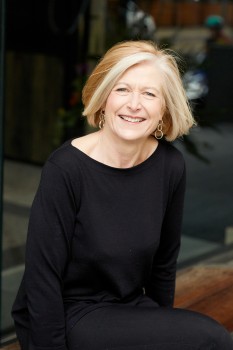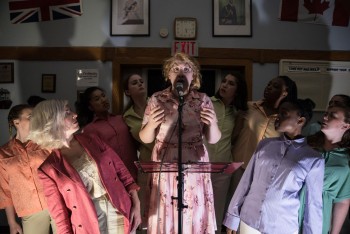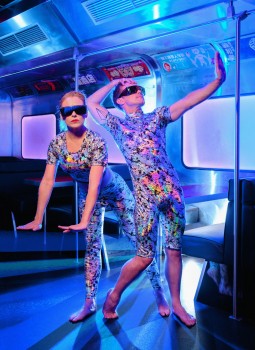In May, two shows stood out for me for different reasons. Picnic in the Cemetery at Canadian Stage’s intimate upstairs Berkeley Street Theatre was an unusual theatrical concert with a whimsical heart and setting, combining often-sublime chamber music (by composer Njo Kong Kie) with simple props, a dancer, short films and onscreen poetic introductions to the various compositions. The beautiful playing by violinist Hong Iat U and cellist Nicholas Yee (supported by the composer on the piano) stood out as enigmatic conversations between their instruments, in much the same way that author Patrick O’Brian describes the often improvisatory, lyrical, shipboard violin and cello duets played by his famous characters Captain Jack Aubrey and Stephen Maturin.
A more traditional musical theatre outing was the TSO’s concert presentation of Leonard Bernstein’s musical Candide This was a wonderful opportunity to hear and see the exquisite Tracy Dahl as Cunegonde, with her crystal clear tone, perfect technique, and delightful acting and star mezzo Judith Forst in great comedic form as the lively Old Lady.
Looking ahead to June, there is no shortage of music theatre on offer but the most striking cluster of offerings is concentrated under the umbrella of the Luminato Festival. I took the opportunity to meet artistic director Josephine Ridge to ask her about her approach and goals for the festival as she nears the beginning of her second season in Toronto.
 WN: Looking at the upcoming Luminato program, what really struck me was how much music there is, but also, and this seems new this year, how politically and socially engaged the whole festival is. Is that because of the current atmosphere we are living in?
WN: Looking at the upcoming Luminato program, what really struck me was how much music there is, but also, and this seems new this year, how politically and socially engaged the whole festival is. Is that because of the current atmosphere we are living in?
JR: It’s actually deeper than that; it’s about the way I view the role of a festival within its home city – that a festival needs to be relevant to the inhabitants of its city and therefore we need to engage with the ideas that are in the public realm of discussion. We need to think about what are the issues, the concerns and the enthusiasms and in other words really what’s in the ether, because if we’re not a festival that is distinctly about Toronto and of Toronto then it means that we are not contributing and adding to the cultural landscape in the way that I believe we should as a festival.
It’s something that I was very proud to have been able to do when I was at the Melbourne Festival.
And it takes time to explore and get to know a new city.
That’s part of the excitement of course, and I think, as in all things, with fresh eyes one has a different perspective, perhaps, as well – and that certainly for me adds to the interest in terms of the conversations that I have.
You have talked before about wanting to have conversations with as many of the arts organizations as possible in the city.
Yes, this is the other side of the engagement and connection that we were just talking about. This is really about understanding what Toronto artists and companies are doing now, and how can we add to that and perhaps together achieve something which each can’t on their own.
There is already growing excitement about that approach from some of the artists I’ve spoken to – at Tapestry Opera for example.
In fact, Tapestry is a good case in point. I quickly came to understand the work that Michael Mori and his company are doing, so the conversation with Michael about this year was around work that they have produced in the past that is really deserving of a wider audience and being revisited and seen in an international festival context. We very quickly got to Nicole Lizée’s multimedia piece Tables Turned. It’s one of the important components of a platform we have created this year called Illuminated Works, which is all about fulfilling one of Luminato’s founding briefs – which was to throw a spotlight on the creativity of Toronto and take Toronto arts to the world. We are bringing a large group of international and Canadian presenters and producers to come and look at a whole range of work, with a view to it being picked up and given national and international touring opportunities. We can’t work with everybody every year but we can make a start and really make sure that over time we engage as widely as we can.
Will you be continuing with these conversations, looking for companies you haven’t yet met, and new artists emerging onto the scene?
Definitely. One of the important roles we have is not only to present work that is complete but also to recognize the proper support that is required for the creative development process of new work, and so in the program this year we have four works that are works in progress.
We’re giving those artists an opportunity to put their work in front of an audience so they can feel how it sits with that audience and feed that learning into the way they then take the work forward for future development.
This will be exciting for audiences, too, to be in on the development process on the ground floor.
Yes, and I think the works we have chosen are far-ranging: Dr. Silver: A Celebration of Life, Hell’s Fury, The Ward Cabaret, and Balaklava Blues.
 And they’re all music theatre – as we define it at The WholeNote – where music is an integral element in telling a theatrical story. This year the mix is very interesting and even more experimental than last year. Do you see music theatre as always being an essential part of the Luminato recipe, particularly as it crosses borders and genres?
And they’re all music theatre – as we define it at The WholeNote – where music is an integral element in telling a theatrical story. This year the mix is very interesting and even more experimental than last year. Do you see music theatre as always being an essential part of the Luminato recipe, particularly as it crosses borders and genres?
Well, I’m particularly interested in artists and their work where they are not working in art-form silos; and distinctions between the definitions of particular art forms now are so blurry. Also, music to me is really central so it’s not surprising that so many works that we are looking at are cross-genre. I also think that the ability that music has to speak to audiences who perhaps might not think of themselves as being a “theatre audience” or a “dance audience,” for example, is exciting.
How did you choose the music theatre pieces this season? Did you start with one that was a cornerstone, the Irish Swan Lake, for example, or did you begin with the underlying themes and ideas you wanted to engage with this season and go from there?
I think it’s partly that I am always drawn to music and so there is no one answer to that. I have a long relationship with Teaċ Daṁsa, Michael Dolan’s company (Swan Lake), and have seen a lot of Michael’s work over the years as a director and choreographer. He is, I think, a unique and important voice, and Toronto audiences and the artists working in Toronto should see the works that he is creating
The excerpts that I have seen online look wildly theatrical.
It’s a completely original reading of such a well-known work, and all the elements of the Swan Lake story are there, but of course it is completely transformed into this really poor community in Ireland. There are no kings and queens and princes here, and the music is original Irish music (with folk references) played live onstage. Somehow even with all of that transformation, the classic story is there, which to me is just magical.
And the Canadian pieces – how did you choose those, Dr. Silver for example?
In the case of Dr. Silver, A Celebration of Life I was invited by Mitchell Cushman of Outside the March, very soon after I arrived in Canada (the middle of 2016), to go to a day of workshops they were holding, and this was one of those works in a very raw form. I met and talked with Mitchell and then also with Mitchell Marcus of The Musical Stage Company, as it was absolutely evident to me that Britta and Anika Johnson are a real creative force. I was interested in not just the direction of that work but of whatever else they were doing, and wanted to signal that I would be interested in finding a way for Luminato to be part of that story to support those artists. Although Dr. Silver has its official presentation in September as a finished work, I asked if it would be useful for them to have an opportunity on the way through to put it in front of an audience, so that’s how that conversation went.
Hells Fury: The Hollywood Songbook [Tim Albery’s concept based on the life and songs of composer Hanns Eisler], on the other hand, came to us as an idea from Lawrence Cherney at Soundstreams. He said “We want to create this work and need a partner.” So, there are many ways in which these projects can come to life. You have to be in the room, seeing work, having the conversation for these outcomes to even occur.
And if artists are interested in having a conversation with you how should they approach you?
I try to go to see artists working at all scales and at all types of work, so people do tend to find me in foyers, but I can also be easily be contacted at Luminato.
The Ward Cabaret you mentioned is also a work in progress – can you tell me a bit more about it?
I think it’s a really important piece because it comes from the recent book The Ward from Coach House Books that deals with the importance of the Ward [an area bounded roughly by Queen and College, Yonge and University] and the cultural diversity of its original inhabitants as being the real basis of Toronto’s cultural diversity today. What David Buchbinder (the show’s originator) has done is have a musical response to that material, and I think it’s going to be really interesting and very rich.
Now that playwright Marjorie Chan and director Leah Cherniak are newly involved in the collaboration, is there any sense yet of how theatrical it is going to be?
What we have now is really a cabaret concert performance, but eventually it will be a fully staged theatrical experience. I can’t tell you when that will be but we are certainly there for the journey.
Before we finish, could you tell me a bit more about Riot, the other show you are bringing from Ireland? It sounds like a smorgasbord of different genres, including music theatre, all mixed together.
Riot is uplifting. It’s funny, energetic, has got real heart and soul, and deals with – going back to your first questions – issues and ideas. It covers quite a lot of really important territory of social politics, in particular, but does it in a way that is very entertaining and lightly done. I think you’ll find a lot of connection to Toronto audiences because of the territory it covers and because it is so entertaining.
 And because of the contrast in style with everything else?
And because of the contrast in style with everything else?
That’s why we are running it a bit longer – so it has a chance to bridge a lot of the other works that are taking place.
The whole festival is longer this year. Is there extra programming or are you spreading things out?
It’s more about pace, allowing there to be some air in between, so hopefully people can see more but also connect the various aspects of the festival. It’s also structural: with only two weekends you begin and you end; with three weekends now we have a beginning, middle and end, and we’re telling a story.
Luminato runs from June 6 to 24 at various venues around Toronto.
Follow our online blog for more previews and reviews of music theatre around Ontario this summer.
Quick Picks
June 1 to 10: Frame by Frame. A new collaboration between international theatrical innovator Robert Lepage with Canadian choreographer Guillaume Côté, celebrating and showcasing excerpts of Canadian filmmaker Norman McLaren’s groundbreaking films. National Ballet of Canada at the Four Seasons Centre, Toronto.
June 6, 7: Soundstreams finishes its 35th season with an exciting two-part music theatre program, the world premiere of James Rolfe’s I Think We Are Angels, with a libretto based on the poems of Else Lasker-Schüler, and a new theatrical version of David Lang’s The Little Match Girl Passion led by music director John Hess and stage director Jennifer Tarver. At Crows Theatre, 345 Carlaw, Toronto.
June 16: Tony Award-winning Scottish actor Alan Cumming (of The Good Wife and many other shows) comes to Massey Hall for one night only with his new cabaret show Legal Immigrant, built around stories and songs of his life and loves in his adopted homeland, the USA.
June 26: A rare chance to see Canadian stage and film star Christopher Plummer live at the TSO, in Christopher Plummer’s Symphonic Shakespeare, at Roy Thomson Hall, Toronto.
July 13 to August 12: Rosalynde (or As You Like It). Driftwood Theatre places one of Shakespeare’s most musical comedies in Canada in 1918, with the songs given new musical settings to fit the period by music director and composer Tom Lillington. In parks around Ontario; see driftwoodtheatre.com/bards-bus-tour for details.
Toronto-based “lifelong theatre person” Jennifer (Jenny) Parr works as a director, fight director, stage manager and coach, and is equally crazy about movies and musicals.



